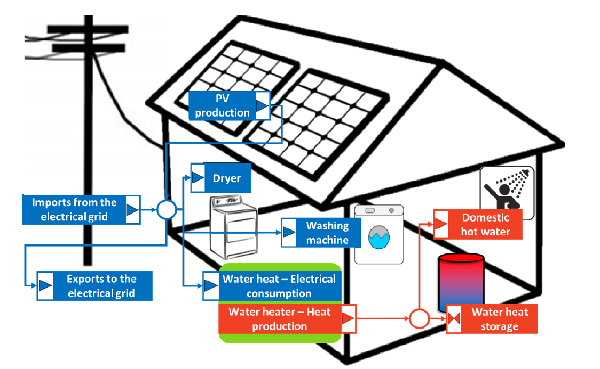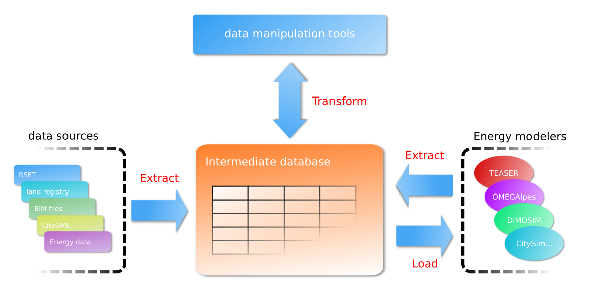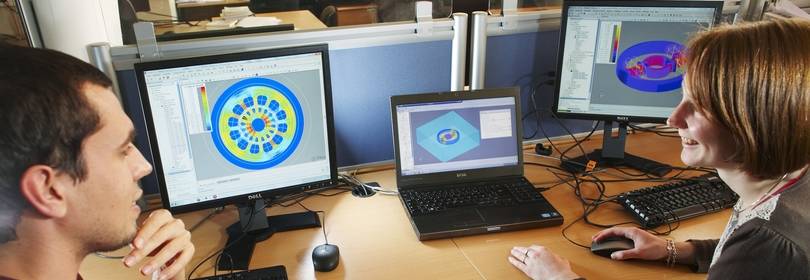Methodology
In this work we are developing a methodology and an associated decision support tool (OMEGAlpes), allowing to make the best use of the flexibility offered by the energy systems of a district. Our approach is based on the definition of optimal multi-fluid energy planning strategies, thanks to the construction of generic and configurable models, dedicated to MILP (Mixed-Integer Linear Programming) optimization. The strength of this solution lies in particular in the provision of controllable energy models, such as flexible consumption models, adapted to the study of load control scenario. The objective is to offer various players in the energy world assistance in designing, sizing, and managing energy systems at neighborhood level.
OMEGAlpes (Optimization ModEls Generation As Linear Programs for Energy System)
It is an open-source modeler of energy optimization problems at the neighborhood level.
documentation : https://omegalpes.readthedocs.io/en/stable/
OMEGAlpes source code is available at the following address : https://gricad-gitlab.univ-grenoble-alpes.fr/omegalpes/omegalpes

documentation : https://omegalpes.readthedocs.io/en/stable/
OMEGAlpes source code is available at the following address : https://gricad-gitlab.univ-grenoble-alpes.fr/omegalpes/omegalpes

Example of energy flexibility
An example of a problem dealt with by OMEGAlpes is the flexibility problem described below and available on the documentation


Accessible online
OMEGAlpes can be used online via for example this Jupyter notebook on self-consumption of a PV system: https://tinyurl.com/ORUCE-BS2021
Other examples help to illustrate the features: https://gricad-gitlab.univ-grenoble-alpes.fr/omegalpes/omegalpes-examples
Other examples help to illustrate the features: https://gricad-gitlab.univ-grenoble-alpes.fr/omegalpes/omegalpes-examples
Modeling of buildings on a neighborhood scale
One of OMEGAlpes' interests is to allow generating a MILP optimization problem without mastering this modeling technique. Thus we are currently developing research work on the integration of heterogeneous data for modeling at the neighborhood scale.

This allow to treat complex optimization problems such as energy flexibility provided by a Thermal Energy Storage (TES) to minimize the CO2 emissions of the district heating load. The energy system studied is composed of the district heated by geothermal groundwater through a heat pump and thermal energy storage to provide demand-side management. The goal is to design the whole supplying system (heat pump and storage). Three OMEGAlpes units are used to model the energy system: the district heating load, the heat pump, and the thermal energy storage :


This allow to treat complex optimization problems such as energy flexibility provided by a Thermal Energy Storage (TES) to minimize the CO2 emissions of the district heating load. The energy system studied is composed of the district heated by geothermal groundwater through a heat pump and thermal energy storage to provide demand-side management. The goal is to design the whole supplying system (heat pump and storage). Three OMEGAlpes units are used to model the energy system: the district heating load, the heat pump, and the thermal energy storage :

Références :
- Pajot, C.; Artiges, N.; Delinchant, B.; Rouchier, S.; Wurtz, F.; Maréchal, Y. An Approach to Study District Thermal Flexibility Using Generative Modeling from Existing Data. Energies 2019, 12, 3632. DOI:10.3390/en12193632
- Pajot, C.; Delinchant, B.; Maréchal, Y.; Frésier, D. Impact of Heat Pump Flexibility in a French Residential Eco-District. Buildings 2018, 8, 145. DOI:10.3390/buildings8100145
Published in MDPI Books, Environmental Impact Assessment of Buildings, Wahidul K. Biswas (Ed.) ISBN 978-3-03928-243-2, https://doi.org/10.3390/books978-3-03928-244-9, 2020 - Lou Morriet, Gilles Debizet, Frederic Wurtz, "Multi-actor modelling for MILP energy systems optimisation: application to collective self-consumption" BS’15, Building Simulation Conference, Roma in September 24, 2019.
- Camille Pajot, Lou Morriet, Sacha Hodencq, Vincent Reinbold, Benoit Delinchant, Frédéric Wurtz, Yves Maréchal, “Omegalpes: An Optimization Modeler as an EfficientTool for Design and Operation for City Energy Stakeholders and Decision Makers”, BS’15, Building Simulation Conference, Roma in September 24, 2019.
- Camille Pajot, Quang Hung Nguyen, Benoit Delinchant, Frédéric Wurtz, Yves Maréchal, Stéphane Robin, Benjamin Vincent, François Debray, “Databased Modeling of Building Consumption Profile for Optimal Flexibility: Application to Energy Intensive Industry”, BS’15, Building Simulation Conference, Roma in September 2-4, 2019.
- Camille Pajot, Nils Artiges, Benoit Delinchant, Yves Maréchal “Optimal Heat Pumps Operation For Demand Response of Residential Buildings At District Scale”, BS’15, Building Simulation Conference, Roma in September 24, 2019.
- Pajot C., Delinchant B., Maréchal Y., Wurtz F., Morriet L., Vincent B. and Debray F. (2018). Industrial Optimal Operation Planning with Financial and Ecological Objectives. In Proceedings of the 7th International Conference on Smart Cities and Green ICT Systems - Volume 1: SMARTGREENS, ISBN 978-989-758-292-9, pages 214-222. DOI: 10.5220/0006705202140222


